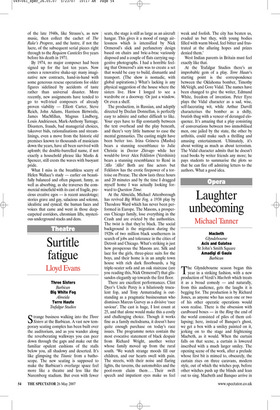Surtitle fatigue
Lloyd Evans
Three Sisters Barbican Big White Fog Almeida Terre Haute Trafalgar Studios Strange business walking into the Three Sisters at the Barbican. A vast new temporary seating complex has been built over the auditorium, and as you wander along the reverberating walkways you can peer down through the gaps and make out the familiar opulent cushions of the stalls below you, all shadowy and deserted. It’s like glimpsing the Titanic from a bathoscope. The new seating is supposed to make the Barbican’s overlarge space feel more like a theatre and less like the Nuremberg stadium. But even with fewer seats, the stage is still as large as an aircraft hangar. This gives it a mood of rangy airlessness which is intensified by Nick Ormerod’s slick and perfunctory design based on chairs and bric-a-brac variously disposed and a couple of flats carrying suggestive photographs. I had a horrible feeling that Ormerod’s aim was to create a set that would be easy to build, dismantle and transport. (The show is nomadic, with global aspirations.) What’s lacking is any physical suggestion of the house where the sisters live. How I longed to see a wardrobe or a doorway. Or just a window. Or even a shelf.
The production, in Russian, and adeptly directed by Declan Donnellan, is perfectly easy to admire and rather difficult to like. Your eyes have to flip constantly between the text overhead and the play beneath, and there’s very little humour to ease the mental gymnastics. The casting might have been better too. Irina Grineva (Masha) bears a stunning resemblance to Julie Christie in Doctor Zhivago while her would-be lover Alex Feklistov (Vershinin) bears a stunning resemblance to René in ’Allo ’Allo! Both are fine actors but Feklistov has the erotic firepower of a tortoise on Prozac. The show lasts three hours and 20 minutes and by the time I dragged myself home I was actually looking forward to Question Time.
At the Almeida, Michael Attenborough has revived Big White Fog, a 1938 play by Theodore Ward which has never been performed in Europe. The Masons, a prosperous Chicago family, lose everything in the Crash and are evicted by the authorities. The twist is that they’re black. The social background is the migration during the 1920s of two million black southerners in search of jobs and tolerance in the cities of Detroit and Chicago. What’s striking is just how prosperous the Masons are. Silk and lace for the girls, three-piece suits for the boys, and their home is in an ample town house with rich dark floorboards, a big triple-seater sofa and an oak staircase (are you reading this, Nick Ormerod?) that glissandos elegantly up towards the first floor.
There are excellent performances. Clint Dyer’s Uncle Percy is a hilariously truculent fop, and Tony Armatrading is outstanding as a pragmatic businessman who dismisses Marcus Garvey as a divisive ‘race saviour’. The cast is huge, I lost count at 25, and that alone would make this a costly and challenging choice. Though it works fine as a family melodrama, it doesn’t have quite enough purchase on today’s race issues. The programme notes contain the most evocative statement of black despair from Richard Wright, another writer whose family moved up from the rural south. ‘We watch strange moods fill our children, and our hearts swell with pain. The streets, with their noise and flaring lights, the taverns, the automobiles and the pool-room claim them ... Their swift speech and impatient eyes make us feel weak and foolish. The city has beaten us, evaded us but they, with young bodies filled with warm blood, feel bitter and frustrated at the alluring hopes and prizes denied them.’ West Indian parents in Britain must feel exactly like that.
At the Trafalgar Studios there’s an improbable gem of a play. Terre Haute’s starting point is the correspondence between the Oklahoma bomber, Timothy McVeigh, and Gore Vidal. The names have been changed to give the writer, Edmund White, freedom of invention. Peter Eyre plays the Vidal character as a sad, wise, self-lacerating wit, while Arthur Darvill characterises the bomber as a shifty, brutish thug with a veneer of deranged eloquence. It’s amazing that a play consisting of conversations between two immobilised men, one jailed by the state, the other by arthritis, could make such a thrilling and amusing entertainment. Ultimately, it’s about writing as much as about terrorism. The Vidal character admits that he doesn’t read books by writer friends any more; he pays students to summarise the plots so that he can fire off admiring letters to the authors. What a good idea.


















































































 Previous page
Previous page